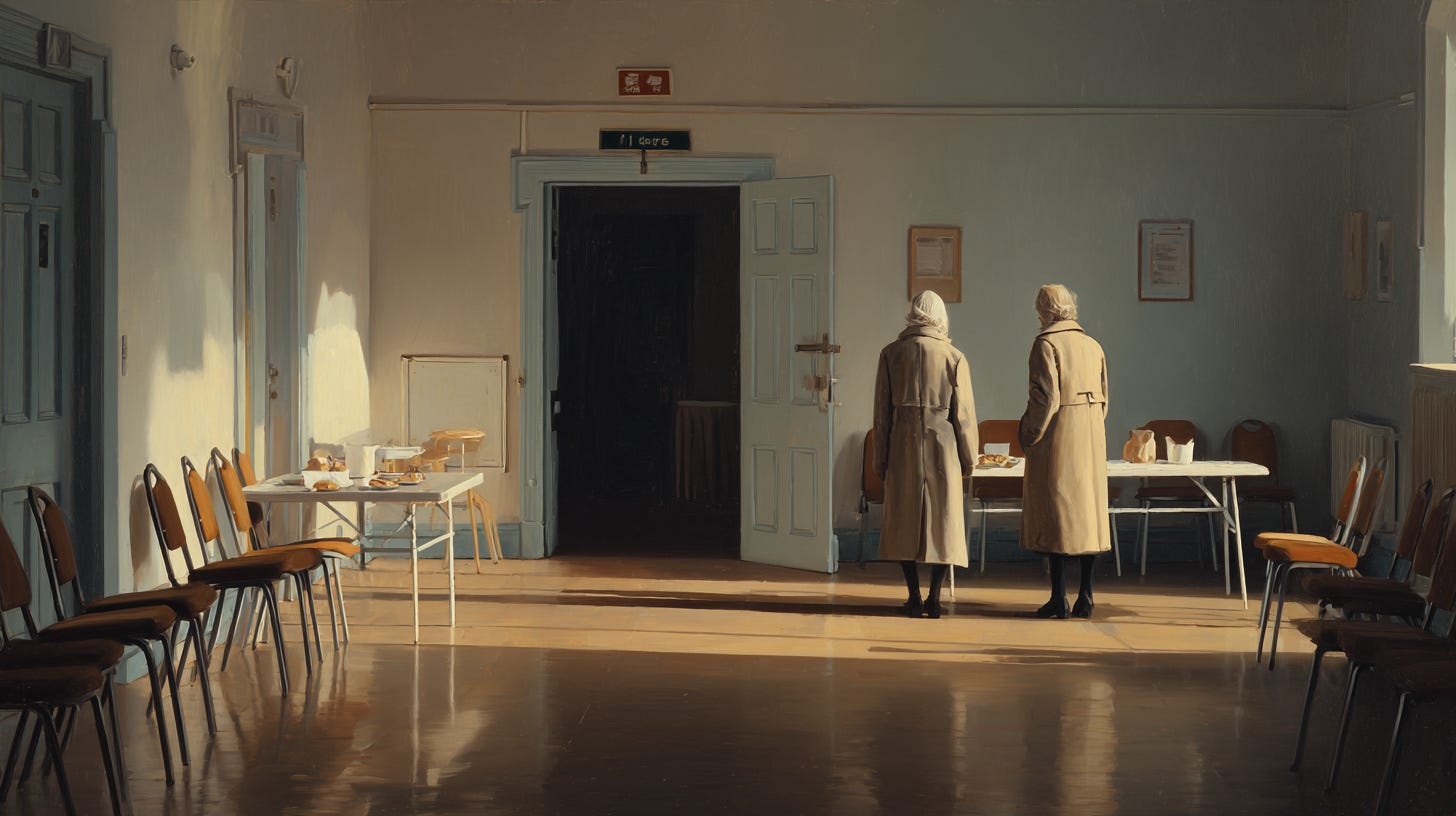He folded his old handkerchief twice and wedged it under the front leg of the chair. His dad used to do that—pub chairs, church pews, anywhere the balance was off. Not for comfort. Just to stop the noise.
Only thirteen people had come. Four looked like family. The rest, former colleagues and pupils. The ones who showed up. The ones who still had something to prove, or bury.
Two women sat near the front, stiff in their seats. Twin grey perms. Identical beige macs. Miss Stanley and Mrs. Roper. Former staff. Long retired. One clutched a handbag with both hands.
The eulogy was bland. “A firm but fair educator. Dedicated to his craft. Demanded excellence.”
No one mentioned the snooker cue. Or the map room. Or the girl who left school mid-year and was never spoken of again.
He watched the others. No one met his eye. The silence between them was compacted by time and habit. The same silence that had hung in the hallways, just before the slap of rubber soles, just before the call of your name.
A low cough. A shuffled hymn. The curtain closed.
He drifted toward the reception room, where weak tea steamed in mismatched mugs. He didn’t speak. Just stood by the radiator, eyes flicking over the sideboard.
On the table, some sandwiches curled at the edges. Uncovered too early—or not at all. Uneaten.
Miss Stanley stood nearby with an empty plate. She offered a weak smile. Her fingers trembled as she adjusted a napkin, though the plate held nothing.
“He could be difficult,” she said, voice thin. “But, he had a passion for discipline.”
He said nothing. Just looked.
Mrs. Roper joined her. She nodded, eyes cloudy. “He kept order. It wasn’t always easy. Children were rough in those days.”
“You heard him shout,” he said.
They didn’t answer. Miss Stanley blinked, twisting the napkin in slow folds.
“It was another time,” Mrs. Roper said. “We did what we could.”
“You did nothing.”
Neither argued.
Their hush brought Gavin back. Scrawny. Lived out by the tip. Second-hand shoes.
He’d kept pushing Gavin. Called him thick in front of the class. Asked if his mother had taught him maths by counting cigarette burns.
Gavin didn’t cry. He threw a chair. Called the teacher a bastard. Said it again. Louder.
The headmaster had just happened to be passing. Gavin was dragged out of the classroom before the other one could get his hands on him.
Suspended. Expelled. Last he’d heard, Gavin was doing time. Five to ten, someone said. Aggravated assault.
“Didn’t expect to see you here,” said Paul. Still freckled. Still leaned in too far, like the handshake was a secret.
His blazer clung like a memory—tight across the shoulders, buttons bowing at the middle.
“Old bastard scared the shit out of all of us, didn’t he?”
Another man joined. Kept his coat on. “Kids these days couldn’t handle it. We were built different.”
“He made us different,” Paul added. “You remember that time he caught me chewing gum? Made me stand outside in the snow the whole double period.”
The man raised an eyebrow. “That were brutal.”
Paul shrugged. “Did me no harm.”
“Your nose bled,” the man said.
Paul chuckled. “Thin skin. Anyway, it toughened us up. I still stand straighter because of him.”
The third man said nothing. Looked at Paul, then down at his hands. “He made you clean the toilet floors with your tie,” he said quietly.
Paul blinked. The smirk wavered. “Yeah, well. I shouldn’t have sworn at him.”
The silence hung. Not empty. Just full of the things they still wouldn’t say.
“My son’s school… they’d have made a call.”
One of them coughed. The other checked his watch. He didn’t look at them.
At home, his son was on the sofa, swearing softly at a laptop. Homework, maybe. Maybe not.
He stood in the doorway a while. “You alright in there?”
A shrug. “Yeah.”
He nodded. “I’ll make something.”
The kettle clicked.
He poured the tea carefully.
And sat where the light came in.


